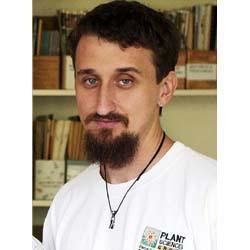CQU graduate already flushed with success
Published on 13 September, 2005
Ben Kele hasn't wasted his studies but he\'s studied waste. He counts among his successes "not falling in the septic tanks once".
The CQU Masters of Applied Science graduate is already flushed with success as he prepares to attend his graduation ceremony in Rockhampton on Saturday, Oct 1.
Mr Kele has developed a new innovative technology for on-site wastewater treatment and reuse and has been awarded an innovation patent.
 He has successfully commercialised the new technology with the formation of the company GBG Project Management Pty Ltd.
He has successfully commercialised the new technology with the formation of the company GBG Project Management Pty Ltd.
Mr Kele has produced more than 15 research publications and has assisted in starting up other water research projects involving CQU.
He has also been successful in his application for a PhD place and associated scholarship; with the research supervisors David Midmore, Bob Miles, and Peter Wolfs.
The Kele Effluent and Wastewater Treatment System (KEWT) is a unique system for the treatment of wastewater and effluent.
KEWT uses a mixture of biological treatment systems and reuses effluent through a self-contained recirculatory form of sub-surface irrigation.
The concept is derived around a system of underground filter beds, connected by pipes within concrete pots that supply water and nutrients to vegetations grown over the channels. The filter beds are planted with a series of native plants, tropical fruit trees and bamboos, which further treat the effluent through rhizofiltration. The plants use the treated effluent as a source of water and the nutrients inherent in the effluent as fertilizer.
With additional treatment stages the system can be used for aboveground reuse purposes, such as toilet flushing and firefighting.
The system has been tested at a number of sites throughout Queensland over the past five years and has proven extremely successful.
The system can be used for domestic purposes, however it is extremely beneficial environmentally and economically where the site is being used for 30 or more people.
KEWT can be retrofitted to existing structures or designed specifically for new infrastructures and there is minimal maintenance needed, compared to alternative systems.
With the help and support of the staff at CQU’s Plant Sciences Research Group, Mr Kele has been able to adapt known treatment systems and develop and refine contained reuse systems that are completely environmentally friendly.
“The system is unique because it combines different types of biofilters within a recirculating evapotranspiration bed. This allows the system to have a relatively high level of treatment combined with a robust resistance to large surges of wastewater,” he said.
“Many of the existing technologies fail to consistently meet the performance guidelines for public and environmental health. The inspiration behind the system was to design a technology that meets the performance guidelines under most operating conditions.
\"The future of the system lies in the commercial/industrial or cluster residential. The system is most economic when used at sites larger than the average domestic household. Tourist developments; especially ecotourism, clusters of residential houses, island developments, etc are all potential applications for the technology.”.

